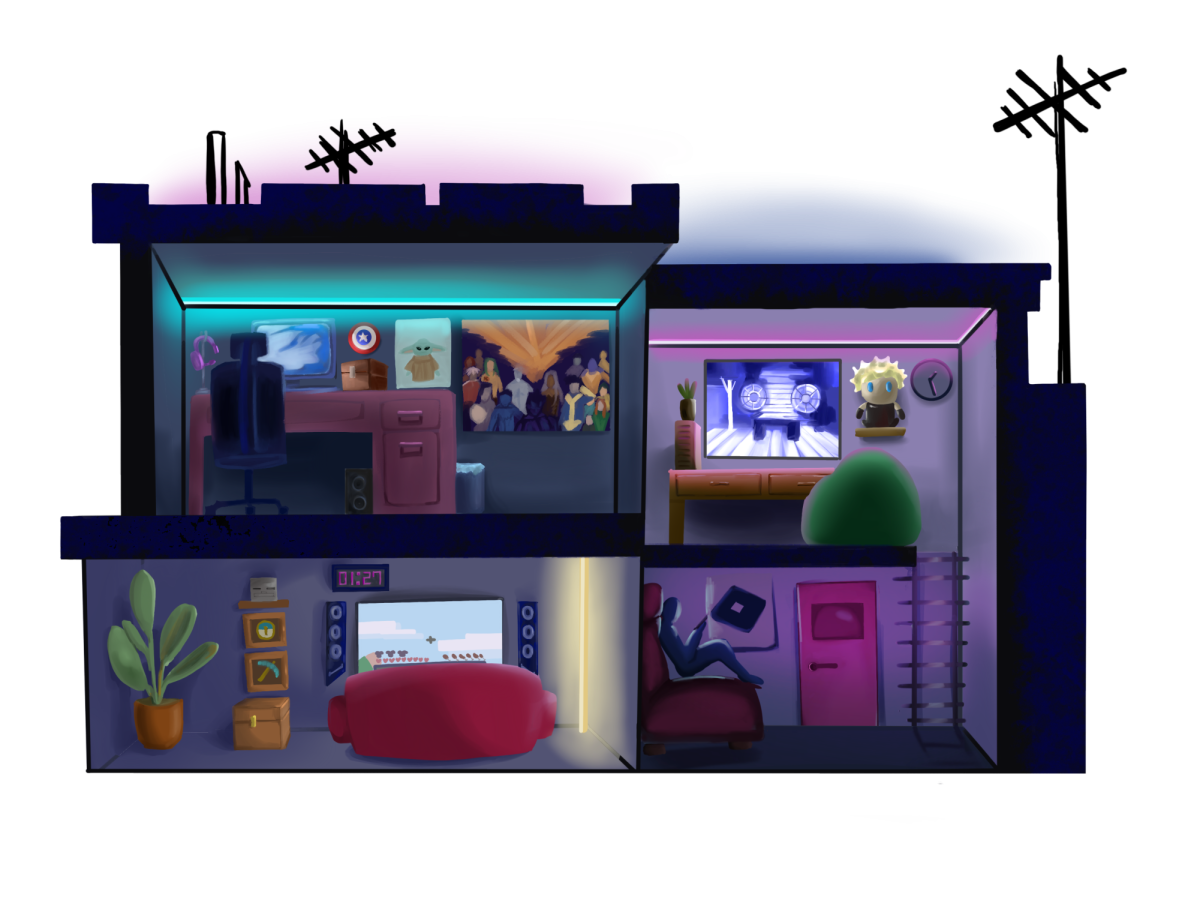Written by Klaire Tan and Katie Russell
Published in the April 17, 2015 issue
Midnight came and passed, and the list of slam poem per- formances to watch grew no shorter. “OCD” by Neal Hilborn, “Spelling Father” by Marshall Davis Jones and of course, perfor- mances by her favorite slam poet: Rudy Francisco. When senior Cadence Calixto finally went to sleep, her head still pounded with the rhythm of slam.
“I became obsessed,” Calixto said, remembering when she first discovered slam poetry. “I would spend hours on YouTube every night, just going from video to video to video.”
In slam poetry, artists share their poems by reciting them out loud. The art form belongs on stage rather than in a classroom or on paper, and it only truly comes alive in the hands of a skilled performer.
“It’s about the performance, just as much, if not more so than the writing,” senior Edut Birger, copresident of Gunn’s Slam Poetry club, said. “Rhythm’s really important. Intonation. Tone. You find connections between the performance and the words they’re saying. The big crescendos. The rhythm. The different diction they have.”
However, slam poetry performances are markedly different from theater performances. The writer is also the performer, which means the artist isn’t sharing someone else’s experiences or work but their own. The result is a much more intimate performance.
“When you see an author perform a slam poem, whatever they are giving you is exactly what they mean and however they are delivering this is what they want you to take away from it,” Birger said. “That’s what’s so intimate and beautiful. It’s honest and very, very personal.”
The Thought Process
As a highly personal medium, slam poems lend a great deal of flexibility to the artist. According to Birger, each poet has his own style of performance and approach towards the writing process. Some artists let a poem sit in their heads for months, slowly pro- cessing the idea before picking up a pen. When they finally do put pen to paper, the first draft is already near halfway to completion. Others jot down a quick, rough draft which they then revise line by line, while a few poets wait for inspiration to hit.
Sophomore Michelle Austreich considers herself to be closest to the last kind. For her, poetry is a product of the situations and emotions that she is going through at the time of writing. Thus, she tries to let her emotions translate naturally into poetry when writing. “I have a few set ideas that I want to include but I never have a set structure that I follow. I just let it carry out,” she said. “I know how I want to start it and I know how I wanted to end it, and in between, I have tidbits of ideas that I want to include, but no structure. As I go, I think, oh, this would work here.”
Junior Crystal Trevillion also sees poetry as a way to capture her feelings from a specific moment. However, she goes through a very different thought process when putting her thoughts on paper. “For me, it’s chronological. I go through what events happened and how I feel about them or how I see them in my perspective,” she said. Trevillion’s poems have mainly been about her battle against leukemia, and she has performed her slam poetry at several events. The personal nature of slam poems add to the difficulty of performing them, according to Calixto. On stage, poets come face-to-face with their audiences while sharing their poem. “Going up in front of everyone is terrifying and beautiful and thrilling,” she said. “The feeling afterwards is unbelievable. You feel so proud because you’ve finally got this off your chest and out there and it speaks to people.”
Getting Started
Since first learning about slam poetry, Birger and Calixto have transitioned from videos on the Internet to real slam poetry venues. Through visits to the Nuyorican Poetry Cafe, a brick-walled cafe in New York well known for hosting slam poet performances, and volunteering at the National Poetry Slam last year, Birger has gained more exposure to the art.
“I don’t think I’m the best performer, overall, but I’m working on it, and every time I perform, I think I get a little bit better,” she said. “When people tell me that something struck them, it really is heart-warming.”
Through Slam Poetry club, Birger and her copresident Jenny Han hope to contribute to a bigger slam community at Gunn and change the perception of “poetry kids being the weirdos,” as Birger put it.
“Spoken word is a powerful form of self expression that needs to be exposed to Gunn,” Han said. “The slam club was created to act as another channel for individuality and hopefully allow people to be more open.”
Han and Birger invite anyone interested in slam poetry to stop by N-104 at lunch on Wednesdays. Beginners are welcome, as the two believe lack of experience can be made up for by enthusiasm. “Slam poetry is a narrative; it’s a performance,” Birger said. “It’s hard to write good pieces of slam, but it’s not hard to get started. Anyone can write slam. You don’t have to be a writer. You don’t have to be a performer.”











